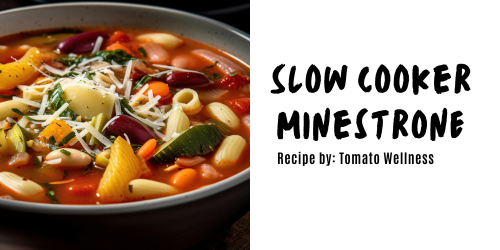Welcome to this month's health and nutrition issue, where we are helping to support the Movember Movement. Movember is more than just an opportunity to sport stylish facial hair; it's a global movement to raise awareness for men's health issues. One area of focus during Movember is prostate health. The prostate is a source of many health issues in men, including benign enlargement, inflammation, and cancer. About one-third of all men over 50 experience BPH (benign prostatic hypertrophy, and prostate cancer is the second most common type of cancer among men in America. Healthy lifestyle habits, early detection, and diagnosis are essential for effective treatment and recovery. Besides regular health screenings, consuming foods rich in antioxidants and phytochemicals can help promote a healthy prostate. In this edition, we'll explore the vital connection between eating well and maintaining good nutrition for prostate health. Discover the foods, habits, and insights that can help you support your well-being and enjoy a healthy lifestyle. Let's dive in! -Stephanie
|
|
|
5 Foods to Promote a Healthy Prostate
|

Tomatoes. According to recent studies, people who consume more tomatoes and tomato-based products have a reduced risk of developing prostate cancer. Scientists believe the lycopene in tomatoes is a powerful antioxidant that helps fight cancer. Tomato paste contains the highest amounts of lycopene, followed by tomato sauce and juice. Other foods rich in lycopene include red grapefruit and watermelon.
Pro Tip: Lycopene is fat-soluble and will be absorbed better when eaten with fat.
Brazil Nuts. These energy-dense, highly nutritious nuts are one of the most concentrated sources of selenium, a mineral linked with antioxidant and cancer-fighting properties. The selenium in nuts may protect against prostate cancer. While selenium is in various foods such as wheat germ, brown rice, eggs, salmon, and oatmeal, brazil nuts contain a high concentration of this essential mineral; eating one to two a day will meet your needs.
Pro Tip: Selenium is best consumed through food instead of a supplement.
Sardines. Sardines and other fatty fish are rich in Omega-3 fatty acids. Fatty fish such as salmon and mackerel provide nutrients men need for heart health, immune system, endocrine, thyroid, and sexual health. Omega-3 fatty acids also promote testosterone production, a hormone that supports the growth of lean muscle mass, sperm production, and a healthy sex drive. A diet high in omega-3 fats is also linked to a reduced risk of prostate cancer.
Pro tip: If you need help getting two servings of fish in your weekly meal plan, you can look for fish oil supplements. Look for supplements that contain EPA and DHA, not just "omega-3s." Also, look for a third-party seal of purity.
Broccoli. Broccoli and other cruciferous vegetables such as cauliflower, cabbage, bok choy, kale, and Brussels sprouts are high in antioxidants, vitamins, and minerals that help to lower inflammation. Cruciferous vegetables contain the phytochemical Glucoraphanin, which researchers suggest can potentially target and prevent the growth of cancer cells. Naturally rich in fiber, eating more of these veggies will not only help keep you satisfied but support regular bowel movements.
Pro Tip: Avoid belly bloat or increased gassiness by letting your digestive system adjust over time. Start with smaller portions and gradually increase your intake.
Green Tea. Rich in anti-inflammatory properties, green tea has many benefits that can help enhance men's health and well-being. Studies have found that men who drink green tea have a lower risk of developing certain cancers, including prostate cancer. Other benefits of green tea include:
- Reduced joint pain and stiffness.
- Healthy blood sugar levels.
- Decreased cholesterol and triglyceride levels.
Pro Tip: Green tea could interact with certain medications, such as beta-blockers or blood thinners; therefore, talk with your doctor if you're taking medications or have any underlying health issues.
Remember that a well-rounded, balanced diet with plenty of fruits and vegetables, whole grains, and lean proteins is essential for overall health. It's also important to maintain a healthy lifestyle, including regular exercise and avoiding excessive consumption of red meat and processed foods. If you have concerns about prostate cancer, consult a healthcare professional for guidance.
|
|
|
Mo Health Tips for Movember
|

- Participate in regular physical activity. The American Heart Association recommends that adults exercise 30 minutes daily, five days a week. Even if you can't always find the time to schedule structured exercise, find small ways to increase movement each day, such as using a standing desk when possible, taking the stairs instead of the elevator, or standing and pacing while talking on the phone versus sitting. These small bouts of movement can add up to significant improvements in long-term health.
- Eat nutrient-dense foods. Aim to consume nutrient-dense foods like beans, whole grains, fruits, vegetables, lean proteins, and plant-based fats. These foods are important because they provide energy and nutrients for a healthy mind and body.
- If you drink alcohol, drink in moderation. Limit to one drink or less per day for women and two drinks or less per day for men.
- If you smoke, quit.
- Make sleep a priority. Getting the right amount of sleep is essential for overall health and well-being, especially hormone health. One night of poor sleep can increase hunger and cravings, insulin resistance. and fatigue. Sleep deprivation is linked to heart disease, obesity, depression, and other medical problems. To get the 7 to 9 hours of sleep recommended for adults, create a consistent bedtime routine that includes no electronics at least 30 minutes before bed.
- Get an annual physical. There are routine tests that will help you stay healthy and detect any medical problems you may not be aware of experiencing.
- Practice more mindful moments. Learn how practicing mindfulness while eating can help you make healthier food choices and manage stress, which can have a significant impact on overall wellness. Delve into strategies for reducing stress and improving mental health.
|
|
Featured Recipe
Slow Cooker Minestrone Soup
|

Recipe from Tomato Wellness
Ingredients:
- 2 tsp olive oil
- 2 cloves garlic, minced
- 1 small yellow onion, diced
- 3 medium stalks celery, chopped
- 3 medium carrots, peeled and chopped
- 2 tsp dried oregano
- 1 tsp kosher salt
- 1 quart low salt added chicken or vegetable stock
- 1 (28 oz) can, no salt added diced tomatoes
- 2 cups large chunks of butternut squash
- 1 cup canned kidney beans, rinsed and drained
- 1 cup canned white bean, rinsed and drained
- 1 cup ditalini pasta
- 5 sprigs fresh thyme
- 1 bay leaf
Instructions:
- Heat oil in a slow cooker set to sauté function. Add garlic, onion, celery, and carrots and cook for 2 minutes.
- Add oregano and salt and cook for an additional 3 minutes.
- Add stock, diced tomatoes, squash, and beans and stir.
- Using a piece of kitchen twine, gently tie thyme sprigs and bay leaf into a bundle and toss in the slow cooker.
- Cover and cook on HIGH for 4 hours (or on LOW for 6 hours).
- When there are 20 minutes left of cooking time, remove the lid and stir in the pasta. Cover and cook for the remaining time.
- When cooking time is up, remove the thyme bundle and discard.
- Ladle into bowls and serve. Cool and store leftovers in the refrigerator for up to 1 week or in the freezer for up to 3 months.
|
|
|
Be Inspired
|
|

|
|
|
About SO Nutrition
|
 Stephanie Leipprandt Ouellette, MBA, RDN, LD
Stephanie Leipprandt Ouellette, MBA, RDN, LD Stephanie has been working in the field of nutrition and dietetics since 1995. She earned a Bachelor of Science degree in Dietetics from Michigan State University, completed an Approved Pre-Professional Practice Program at Western Michigan University and earned a Master of Business Administration from Baker College. She’s been a Registered Dietitian Nutritionist since 1996 and licensed in Texas since 2007. In 2008, Stephanie earned her certification in Childhood and Adolescent Weight Management. Stephanie has extensive clinical & managerial experience, both in corporate settings and in the community. Now she wants to share her knowledge with you, because most (if not all) nutritional habits begin at home.
Stephanie and her family reside in Katy, Texas
|
|
| |
Copyright © 2023 Customized Nutrition Newsletters, All rights reserved.
|
|
| |
|
|